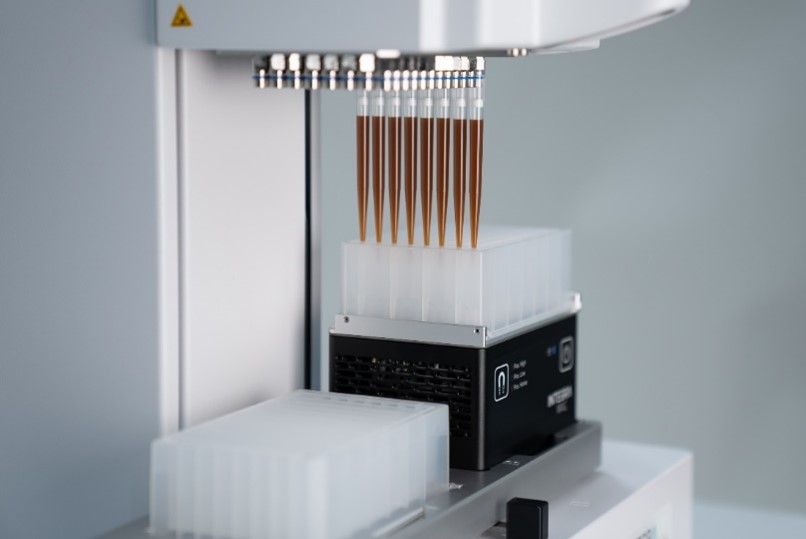INTEGRA Biosciences unveils new accessories for high-volume magnetic bead protocols
INTEGRA Biosciences has announced the launch of a deep well plate adapter and magnetic array for its MAG module, enhancing the capabilities of its automated magnetic bead handling systems. This development promises to streamline high-volume workflows in molecular and proteomics research.
Advancing magnetic bead technology
Magnetic bead protocols have become increasingly popular in molecular and proteomics research due to their superior scalability in terms of throughput and volume compared to traditional column-based approaches. However, manual execution of these protocols can be tedious and prone to errors, particularly when it comes to avoiding bead aspiration.
INTEGRA’s MAG module, when paired with the ASSIST PLUS pipetting robot, offers a solution to these challenges by providing precise, automated magnetic bead handling and separation. The system eliminates the need for manual plate shifting, as it utilises a moving magnetic array to bind or release beads. The newly introduced deep well plate adapter and magnetic array significantly expand the MAG module’s versatility. These accessories enable researchers to use INTEGRA’s deep well plates, supporting protocols with up to 96 samples and volumes of 2.2 ml simultaneously. This development is particularly beneficial for high-volume magnetic bead workflows, offering researchers greater flexibility in their experimental designs.
Versatility across platforms
While the MAG module is optimised for use with the ASSIST PLUS pipetting robot, it also demonstrates compatibility with other INTEGRA platforms. These include the VIAFLO 96 and VIAFLO 384 handheld electronic pipettes, as well as the MINI 96 portable electronic pipette. This cross-platform functionality allows laboratories to adapt the technology to their specific needs and existing equipment.
One of the key features of the MAG module is its adaptability to different labware types. The magnetic array can be quickly and easily exchanged, allowing researchers to tailor the system to their specific experimental requirements. This flexibility is particularly valuable in laboratories that work with a variety of plate formats and sample volumes.
Implications for research efficiency
The introduction of these new accessories for the MAG module represents a significant step forward in automating and optimising magnetic bead protocols. By reducing manual handling and increasing throughput capabilities, INTEGRA Biosciences aims to accelerate research processes and improve reproducibility in molecular and proteomics studies.
For more information, visit: https://bit.ly/47dYfGN
Digital issue: Please click here for more information





